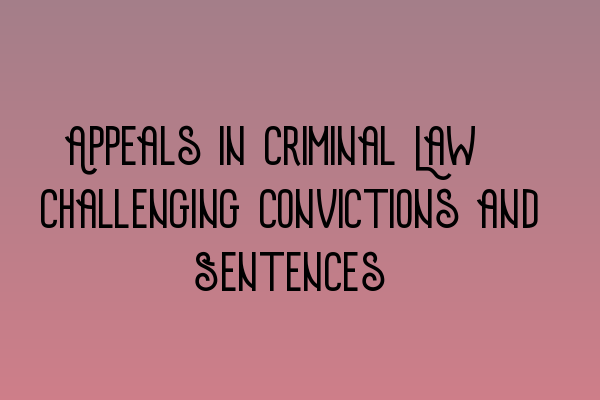Appeals in Criminal Law: Challenging Convictions and Sentences
Welcome to the SQE Criminal Law & Practice blog! In this article, we will delve into the intricate world of appeals in criminal law and explore how they can be used to challenge convictions and sentences. Whether you are a legal professional or an aspiring solicitor preparing for the SQE exams, understanding the appeal process is crucial. So, let’s dive right in!
Understanding Appeals in Criminal Law
An appeal is a legal mechanism that allows individuals convicted of a crime to challenge their conviction or sentence. It provides an opportunity to present new evidence, question legal errors, or argue that the conviction or sentence was unjust or disproportionate.
When it comes to criminal appeals, it is important to remember that they are not retrials. The appeals process focuses on challenging the previous court’s decision based on legal grounds rather than re-examining the factual evidence. It is essential to carefully assess the available grounds for appeal and construct a strong legal argument.
The Grounds for Appeal
Grounds for appeal can vary depending on the jurisdiction and the specific circumstances of the case. However, some common grounds for appeal include:
- Procedural Irregularities: If there were any significant errors made during the trial proceedings that may have impacted the fairness of the trial, such as the exclusion of admissible evidence or improper conduct by the prosecution.
- Legal Errors: If the court misinterpreted or misapplied the law, leading to an incorrect conviction or an unjust sentence.
- New Evidence: If new evidence has emerged, which was not available or discoverable during the trial, and that evidence could potentially undermine the original conviction.
- Substantial Injustice: If it can be argued that the conviction or sentence is manifestly excessive or disproportionate in light of the circumstances or the individual’s culpability.
It is crucial to consult with an experienced solicitor who specializes in appeals in criminal law. They can assess the specifics of your case, identify the strongest grounds for appeal, and guide you through the complex appeal process.
The Process of Appealing a Conviction or Sentence
The process of appealing a conviction or sentence generally involves the following steps:
- Filing a Notice of Appeal: The first step is to file a notice of appeal, which formally notifies the court of your intention to appeal.
- Grounds of Appeal: Along with the notice of appeal, you will need to submit the grounds upon which you are challenging the conviction or sentence. These grounds must be supported by legal arguments and precedents.
- Appeal Bundle: The appeal bundle consists of all relevant documents from the original trial, including witness statements, exhibits, and the trial judge’s summing-up. The bundle is crucial for the appellate court to assess the case.
- Oral Hearing: In most cases, there will be an oral hearing where both parties present their arguments before the appellate court.
- Appeal Decision: Once the appellate court has considered the arguments, they will deliver their decision. They may uphold the conviction and sentence, quash the conviction, vary the sentence, or order a retrial.
It is important to note that the appeal process can be lengthy and complex. Therefore, it is vital to seek professional advice and guidance to navigate through the intricacies of the appeals system effectively.
Preparing for the SQE Exams: Appeals in Criminal Law
If you are preparing for the SQE exams, understanding appeals in criminal law is essential. This topic often appears in the Criminal Law & Practice section of the exam, and having a comprehensive knowledge of the appeal process can significantly enhance your performance.
To ensure you are fully prepared, consider enrolling in SQE 1 Preparation Courses or SQE 2 Preparation Courses. These courses provide comprehensive study materials and mock exams that will help you gain a thorough understanding of criminal law and practice, including the appeals process.
Additionally, practicing SQE 1 Exam Questions and SQE 1 Mocks FLK1 FLK2 is highly beneficial for reinforcing your knowledge and improving your exam technique. The more familiar you are with the structure and content of the exam, the better equipped you will be to tackle questions related to appeals in criminal law.
Stay Up-to-Date with SQE Exam Dates
As you navigate your way through the SQE exams and your career in criminal law, it is essential to stay informed about the latest exam dates and updates. The SRA SQE Exam Dates article provides a comprehensive overview of the upcoming exam dates, ensuring you never miss an important deadline.
By staying up-to-date and constantly expanding your knowledge, you are laying the foundation for a successful career as a criminal law solicitor.
We hope this article has shed light on the appeals process in criminal law and highlighted its significance in challenging convictions and sentences. For expert advice and guidance on appeals or any other aspect of criminal law, do not hesitate to contact SQE Criminal Law & Practice Law UK.
